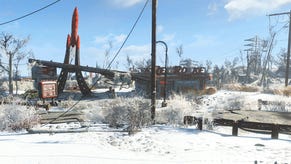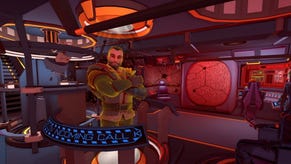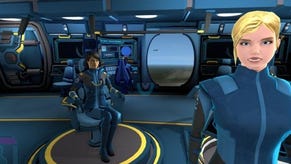Impressions: Consortium
Bishop to Knight Four
A couple of hours into the pre-release version of Consortium, I realised that I was playing a version of the ‘One City Block’ RPG. The location is an aircraft rather than a collection of streets and buildings, but the philosophy holds up. Create a manageable location, a believable population to inhabit it, and provide the player with enough freedom of expression to define their role in the events that unfold. It's an unusual sci-fi adventure game with a splendidly credible cast of characters and a strong sense of mystery.
In Consortium, a futuristic aircraft is making a voyage when disaster strikes from various quarters. The crew aren’t heading to the Bloodmoon of Nebulon Ziggurat XI though, they’re on their way to Dublin. This makes me happy.
Consortium is a murder mystery, a political drama and a heavy dose of weird science fiction. It’s the fiction that’s weird rather than the science – the technology is mostly made up of believable near-future devices, with a few notable exceptions, but the story itself is strange from the outset. Contrary to expectation, the writing creates a state of peculiarity and uneasiness by containing so much that is ordinary.
A pilot talks of his love and concern for his elderly mother, Nancy Drew books are making a comeback on the nostalgia circuits, and there are tensions, friendships and flirtations to unpeel. The craft isn’t home to blue-skinned aliens and lizard people, but the crew are a diverse bunch nonetheless. The variety of accents is pleasing, as is the quality of the voice acting, and the international make-up of the player’s colleagues isn’t just an aesthetic choice – like almost every other detail, large or small, it’s a clue.
As much as anything else – and it is many things – Consortium is a game about collecting clues. The whole story is built inside an odd framing device, placing the player in the role of ITALIC an actual player of sorts, controlling the actions of a living person in another time by means of magical technology. The puppet that the player inhabits is Bishop Six, and whether that’s a name, rank or some other designation isn’t explained outright. Other crew members have similar titles, a chess piece and then a number, and a basic hierarchy can be recognised, but the specific role of each piece isn’t clear. And nor is it meant to be.
That’s a lot of words about the setting and maybe you’re wondering what exactly it is you’ll be doing while you play? You’ll be doing first-person things, like exploring the ship, talking to people using a multiple choice interface and, occasionally, shooting people in the face. Just as in real life, it’s much more pleasant talking to people than shooting them, and aside from choices between lethal and non-lethal weaponry, combat is fairly unimaginative. It’s also optional, and the right relationships or conversation choices can keep the bullets from flying.
I’d intended to talk my way out of any violence during the first encounter but accidentally unholstered my weapon right in a mercenary’s face. He reacted as if I’d unholstered something else entirely and done a wee all over his shiny military boots. That is to say, he shot me repeatedly. Hitting the wrong button (again), I switched from my stun gun to an assault rifle and a minute of frantic shooting, hiding and grenade lobbing followed.
The crew chastised me for murdering the boarders, including their leader, because we’d come up with a plan to end the situation non-violently. They thought I’d deliberately deviated from that plan and I couldn’t seem to explain to them that I’d just pressed the wrong buttons at the wrong time. By mistake! I was glad that it had happened though. It fit with the game’s central conceit and demonstrated that the combat, plain as it may be, involves decisions and creates reactions among the crew.
That conceit, of interacting with real events using a science fiction interface, could have been a gimmick, but it becomes core to the more unsettling aspects of the story. There are awkward moments and tensions from the outset, as questions about basic functions of the craft and its crew lead to puzzled queries. You’re supposed to know these things, or at least Bishop Six is supposed to know these things, and displaying ignorance can lead to distrust. Thankfully, he’s a newcomer to the ship and his personality is a tabula rasa, to be decided by conversation choices and actions. Beyond that, there are duties to fulfil and expectations to meet, and there are no information dumps to help the player along, with the exception of an optional console that provides a huge amount of in-fiction backstory.
It’s one of the few science fiction games I’ve ever played that manages to make me feel like a stranger in a strange land, and at times the feeling is uncanny. Glitches in the interface sometimes coincide with characters doubting the sanity or integrity of Bishop Six and despite their slightly crude cartoonish facial expressions, the more inquisitive characters often feel like they’re on the verge of peering straight through the screen.
More than a gateway device, the fictional interface creates a second layer of ‘reality’ to play with and disrupt. Setting up the player’s role in this way also makes the fourth wall (or at least A fourth wall) part of the plot, allowing events to scratch along its surface, looking for a way through.
Joining the story in media res forces the player to think on his/her feet and also asks a great deal of the writers but they’re equal to the task. Consortium exists within a truly weird sci-fi universe, glimpsed through windows like Larkin's Whitsun Weddings, but so much that is unusual in it is recognisable. The characters don't spout exposition, instead revealing the nature of this possible future by degrees. They complain about the mundanity of their jobs, drop hints about the political situation and recent historical conflicts, make references to pop culture, both known and unknown. By sharing their own stories, piece by piece, they gradually give an impression of their world.
Mechanically, Consortium is functional rather than exhilarating. Conversations are handled well. The rest of the ship doesn’t freeze while they occur and participants recognise the player’s vicinity, to an extent, allowing Bishop Six to wander off like an ignorant sod. This doesn’t go unnoticed. Replaying sections does makes me wish I could skip dialogue though, particularly on occasions that a group conversation is taking place without a great deal of player input.
A ship defence mini-game threatens to derail the flow of the game, like Dead Space’s ponderous asteroid blasting, but turns out to be a pleasant enough diversion. Importantly, it doesn’t separate itself entirely from the narrative, with the same lethal and non-lethal choices appearing as elsewhere, lending a relevancy that would otherwise be missing.
The characters are the heart of the game though. They’re a sympathetic bunch and the writing avoids stereotypes. The fact that the player's Bishop Six has such an influence over their existence creates tension and drama, even before the stakes rise, and deeper questions begin to surface about the nature of the Earth in their time.
There are surface similarities with Mass Effect ,and the interaction with crew and the layout of the craft with the pilot in his isolated cockpit, support the comparison. I initially thought of the game as ‘the best parts of Mass Effect’ but that’s unfair to both games. Consortium has more in common with The Last Express or even a recent Telltale release than Bioware's space opera, and the stories it tells are both far stranger and far more believable than I’ve come to expect from sci-fi games.
Consortium is almost ready for release and is currently seeking attention on Steam Greenlight.












